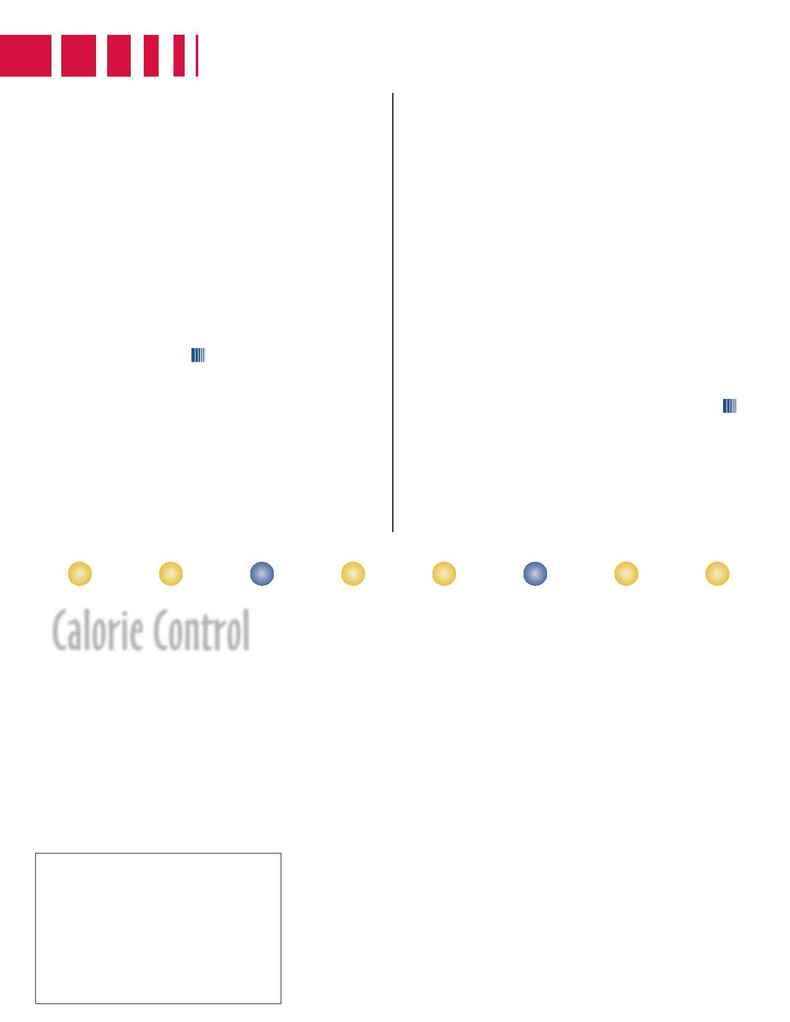
Providing timely information on low-calorie and
reduced-fat foods and beverages, weight manage-
ment, physical activity and healthy eating.
Calorie Control Commentary (ISSN 1049-1791)
is published by the Calorie Control Council, an
international non-profit association of manufac-
turers of low-calorie and reduced-fat foods and
beverages. Commentary is written by Council
staff, which includes specialists in nutrition, food
science and food safety.
© 2003 by the
Calorie Control Council
5775 Peachtree-Dunwoody Road,
Building G, Suite 500, Atlanta, Georgia 30342.
Phone:(404) 252-3663.
E-mail: ccc@kellencompany.com.
Internet: www.caloriecontrol.org.
Permission to reprint from Calorie Control
Commentary in whole or in part is granted provided
customary credit is given.
Calorie Control
C O M M E N T A R Y
the following reasons consumers cite for their lack of lasting weight
loss: don't exercise enough (50%), metabolism is slowing down
(47%), don't have enough self-discipline (36%), often splurge on
favorite foods (36%), snack too much (33%), eat too many high fat
foods (28%), overeat at mealtimes (26%) and eat for emotional
reasons (28%).
The bottom line is that each individual is responsible for his or
her health. Although schools, government, the food and beverage
industry, etc., can aid consumers in making healthy choices (by
offering reduced-calorie and reduced-fat options, more health and
nutrition information, etc.,) the choice is ultimately up to the con-
sumer. Those who choose to exercise and eat a variety of foods and
beverages for an overall healthy diet are taking control of their weight
and ultimately their health.
References:
Alm, Richard, "Frito-Lay Teams with Cooper Aerobics for `Smart' Food Labels."
Dallas Morning News, August 6, 2003.
Chicago Tribune, "Suburbanite Sprawl." September 12, 2003.
Condor, Bob, "Industry Should Fight `Scam Gangs.'" New Products Magazine, January 2003.
Kemper, Vicki, "New Priorities Leave PE, Obese Children Behind." LA Times, September 15, 2003.
Lawton, Wendy, "Institute Will Focus on Obesity." The Oregonian, August 26, 2003.
MacPherson, Karen, "Congress May Help Children Fight Fat." Toledo Blade, September 15, 2003.
Steinberg, Brain, "Coke Ad Push Underscores A Wide Range of Choices." Wall Street Journal,
August 28, 2003.
The Obesity Crisis -- Who's to Blame?
(continued from page 8)
Low-Calorie Sweeteners May Be Useful in Weight Control
(continued from page 2)
in energy. Additionally, those in the sucrose group experienced an increase
in weight while the sweetener group experienced a decrease in weight. Fat
mass also increased in the sucrose group but decreased in the sweetener
group. The researchers noted, "Overweight subjects who consumed fairly
large amounts of sucrose (27 percent energy), mostly as beverages, had
increased energy intake, body weight, fat mass and blood pressure after 10
weeks. These effects were not observed in a similar group of subjects who
consumed [low-calorie] sweeteners."
Many food and beverage manufacturers offer reduced-calorie and
reduced-fat versions of consumers' favorite products. And, a 2000 survey
conducted by the Calorie Control Council shows that 79 percent of con-
sumers use low-calorie, reduced-sugar and sugar-free products; 68 per-
cent of these consumers use these products either daily or several times a
week. Using such products, as this study has shown, can be helpful in
weight control. Fifty fewer calories a day (net, and not compensated for)
can lead to a five-pound weight loss over the course of a year, and many
reduced-calorie products offer calorie savings of up to 150 calories.
References:
Raben, A., et. al. Sucrose Compared with Artificial Sweeteners: Different Effects on Ad Libitum
Food Intake and Body Weight After 10 Weeks of Supplementation in Overweight Subjects.
American Journal of Clinical Nutrition. October 2002. Vol. 76. No. 4. 721-729.
